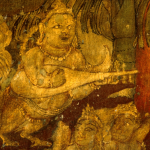The beauty of ancient Indian culture lies in its power of driving perspectives through lessons of life hidden in life. Let us look at the significance of the lion in Jainism.
Lion, the majestic being is known for its royalty. It is not the strongest or the biggest animal on earth; yet, due to its self-confident, courageous and fearless demeanor, it is regarded as the king of the jungle.
Lions are the only ones amongst the big cats who live in groups (other than cheetahs who stay in paired male coalitions as well). A pride of lions consists of 3-40 members including mainly lionesses and cubs with up to 3 males guarding the pride. This behavior of lions gives them the ruling, guarding, responsible and brave outlook. Social skills in animals have been linked to larger brain size and sophisticated cognition. The lions have the biggest skull amongst all of the big cats but Tigers have the largest cranial space. Still, it’s a lion that is considered to be the most intelligent. According to a study published in the journal, Animal Cognition: Lions possess high order cognitive skills owing to their social nature as compared to their solitary relatives: leopards and tigers.
The lion is not listed in the top 10 or 15 strongest animals in the world, yet it is considered the epitome of strength and power. This being’s dignity, valor and grace have got him a special place and significance in various religions and cultures. God Narsimha & vahana of Goddess Durga in Hinduism, a symbol of kingship in Christianity & Judaism, a symbol of royalty & chivalry in Islam, Symbol of 24th Tirthankar Mahaveera & one of the most auspicious 14 (Shwetambara section)/16 (Digambara section) dreams in Jainism, guardians or protector of dharma in Buddhists, owning of the surname ‘Singh’ by the Sikhs; the lion is a significant symbolic figure in not just India but many of the European, African and Asian countries.
The most intriguing is the significance of the lion in Jainism. This voracious carnivore has a noteworthy stance in this non-violence practicing religion. It may not be an ideal organism in all terms, but is a good exemplification of ‘Aparigraha’, one of the key virtues in Jainism. According to this virtue, one must limit one’s possession of worldly/materialistic things to one’s necessity. As worldly wealth and pleasures are considered to be directly linked with the generation of sinful mindset and conduct, therefore are regarded as obstacles in one’s path towards salvation. Complete aparigraha is followed by saints who abstain from having any belongings, and limited abstinence by the followers in general.
Conduct of lion exhibit aparigraha as they hunt only when hungry. If viewed scientifically, hunting requires lots of time and energy, chasing the prey and bringing it down. To prevent wasteful utilization of energy, the lion restricts hunting to times only when it is necessary. It employs basic investment and gains calculation. Learning from the lion, one should utilize his time and energy wisely, as they are the most powerful resources one has. Converting these resources into bank balances or filled lockers that are not used in one’s lifetime, is a futile effort. These precious resources, if utilized for one’s growth or other noble deeds like helping fellow humans or animals and creating a better place to live, can be of immense value. The practice of aparigraha also promotes the donation of whatever is extra, this ensures the distribution of resources in such a way that everyone’s needs can be fulfilled.
This virtue brings with it the importance of awareness and clarity of one’s actions. For example, feeding oneself is an essential need. But gorging on food for leisure or wasting it, makes one a sinner. Overindulgence in food is bad not only from the health point of view but also social perspective. It deprives other living entities of this basic necessity. According to the global hunger index, India has a level of hunger that is serious. As responsible citizens, it is our moral duty to contribute to saving those who lose life to lack of nutrition. By just being watchful about eating patterns will not only help ourselves but other fellow beings as well. This is just one aspect of awareness. Awareness can be practiced in different spheres to harness various benefits.
In Jainism, it is said that the path towards salvation or moksha can be attained, just by being aware and acting accordingly. Miniscule of our actions today can create a huge impact tomorrow. Therefore, developing a habit of being aware of one’s self is the best practice one can start immediately without any investment and can reap benefits throughout life.
















Add Comment